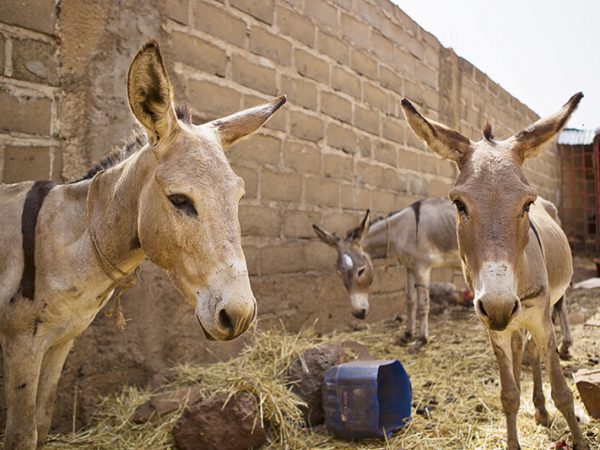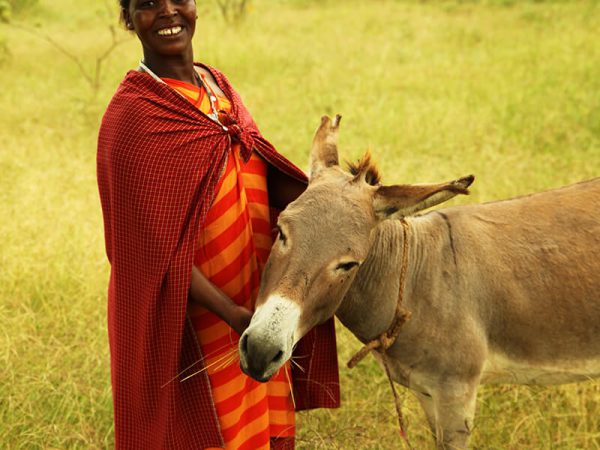Millions of donkeys are at risk because of rapidly growing demand for ‘ejiao’, a product made from donkey skins used in traditional Chinese medicine. Working alongside international and local NGOs, SPANA is calling for an immediate halt to the ejiao trade.
What you need to know
What is ejiao?
Ejiao or donkey hide glue, is a gelatinous substance, made from boiling the hides of donkeys, which is used in traditional Chinese medicines and beauty products.
Ejiao manufacturers claim the substance has many health benefits, including reducing wrinkles, curing anaemia, boosting energy, enhancing libido, and shrinking tumours. But there is little scientific evidence to support these claims.
The recent growth in the Chinese middle class has led to a surge in consumer demand for ejiao.
What impact is this having on donkeys in countries where SPANA works?
The donkey skins used in the product were previously largely sourced from Chinese farms. But with China’s donkey population dropping from 11 million in 1990 to 5.4 million in 2016, manufacturers are now targeting donkeys from Africa to meet demand. This is having a significant impact in a number of the countries where SPANA works – for instance, Botswana’s donkey population has decreased by 38 per cent in two years.
Donkeys that are sold for their skins are often treated terribly throughout the transport and slaughter process loaded roughly onto cramped, dangerous vehicles, starved, and killed brutally.

What impact is this having on the communities that rely on working donkeys?
Working donkeys are vital to the livelihoods of many poor communities in countries such as Mali, Botswana and Zimbabwe. The increased demand for donkey skins from Africa has caused the price of a donkey to inflate by three to four times in some countries, making donkey ownership unaffordable for many and devastating communities.
Donkey thefts have also become rampant.
Have any countries banned the trade?
At least 10 African countries have now announced bans or restrictions on the trade, including Mali, Botswana, Tanzania and Niger. It’s a good start, but there’s still a long way to go, and SPANA is committed to seeing a halt to the trade across Africa until its impact is assessed.
What is SPANA doing to stop this trade?
SPANA is working closely with a number of national governments in Africa to implement bans or restrictions on the slaughter of donkeys and export of donkey products.
In some cases, bans have caused the trade to move underground, and so enforcement is critical. SPANA is helping to run workshops with local police forces and regulators in countries including Zimbabwe to ensure that laws and regulations are effectively imposed.
SPANA is working alongside a number of other organisations, including The Donkey Sanctuary, Brooke and World Horse Welfare, to raise global awareness of the issue among retailers and help authorities keep track of the illicit trade in skins.
We’re also directly engaging with the communities that have been impacted by the ejiao trade.
Botswana donkey skins conference
In July 2019, SPANA organised a major conference in Botswana to highlight the devastating impact of the global trade in donkey skins. Attended by government officials, village chiefs, industry leaders and media, the conference led to widespread agreement that urgent action is needed and positive steps were taken towards fighting the trade.

What are some of SPANA’s successes in this area?
In Zimbabwe, our SPANA team joined forces with a number of other local groups to successfully lobby the government to prevent a major new donkey abattoir from opening.
In Tanzania, SPANA is providing support to a local partner to educate Masai tribespeople in how to protect and secure their animals, working with them to build corrals to keep donkeys safe.
In Botswana, we’ve been running community education programs to raise awareness of the ejiao industry and the long term economic impact of selling working animals. But resolving such a broad and ever changing issue won’t happen overnight, and support from the public will be absolutely vital to continuing our work in Africa.
